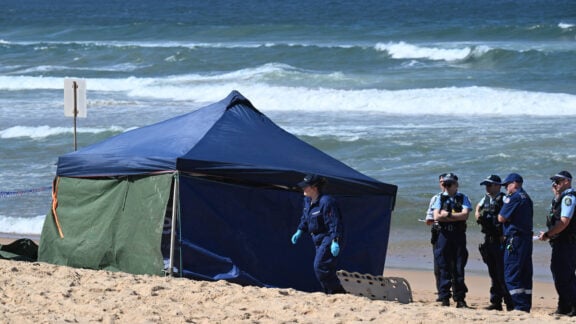An incendiary device exploded early Sunday outside the apartment block where a former senior state investigator probing Greece’s worst train tragedy lives, police said.
Athens News Agency reported that unidentified individuals had placed it at the entrance of the and that it had exploded shortly before 3am on Sunday.
The explosion caused minor material damage to the entrance and police found the remains of gas cannisters, firecrackers and duct tape.
State security is investigating the incident at the building, which according to police sources is where Christos Papadimitriou, until recently head of the state accident investigation agency’s railway sector, lives.
Papadimitriou resigned early in April, citing “personal and family reasons”, having said he had received threats over his work.
That followed a row over statements he made about the fireball explosion that followed the devastating train collision of Tempe in 2023.
Fifty-seven people, most of them young students, were killed in February 2023 when a passenger train and a freight train collided in Tempe, central Greece, having been allowed to run on the same track.
But investigators say some those who died were killed not in the crash but by an 80-metre (260-feet) fireball that came after the collision.
Questionable’ methodology
On February 27, Papadimitriou presented a report that indicated the “possible presence” of an “unknown fuel” that could have caused the fireball, a conclusion that has divided experts.
In subsequent television interviews he said that European train safety officials had pressed for this conclusion to be included in the report, but that it required further investigation.
“I received threats because I continued to look into it,” he told Skai TV. The fireball theory was based on “questionable” methodology that was “not universally accepted” by experts, he added.
Papadimitriou mentioned that there was an alternative theory that involved train engine silicone oils. If that theory turned out to be correct, then “all trains” running in Europe” could be “dangerous”, he had warned.
The disaster and its aftermath have sparked strikes and hundreds of protests in Greece and abroad this year.
It has also led to two votes of no confidence in the conservative government, which the administration overcame.
The train’s Italian-owned operator Hellenic Train has denied knowledge of any illegal cargo on the freight train.
Prosecutors have so taken action against more than 40 people over the accident, including the local station master responsible for routing the trains.
A trial into the accident is not expected before the end of the year.
Early in April, a bomb exploded outside the Athens offices of Hellenic Train, after anonymous calls to Greek media warned of the attack near one of the capital’s busiest highways. No one was injured.
Source: AFP








